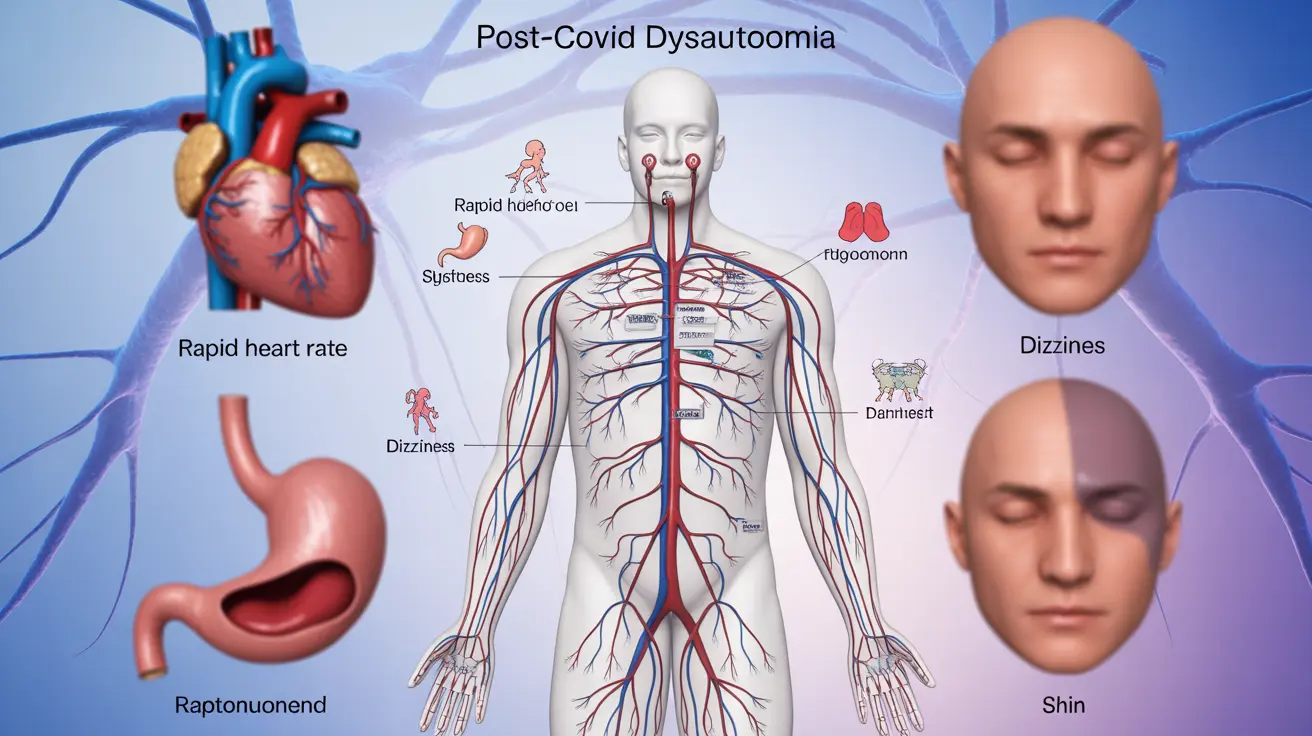After recovering from COVID-19, some individuals experience ongoing health challenges related to their autonomic nervous system, a condition known as post-COVID dysautonomia. This complex disorder can significantly impact daily life, affecting everything from heart rate and blood pressure to digestion and temperature regulation.
Understanding post-COVID dysautonomia is crucial for both patients and healthcare providers, as early recognition and proper management can lead to better outcomes. This comprehensive guide explores the key aspects of this condition, including symptoms, diagnosis, and treatment approaches.
Understanding Post-COVID Dysautonomia
Post-COVID dysautonomia occurs when COVID-19 infection disrupts the normal functioning of the autonomic nervous system, which controls involuntary body functions. This disruption can lead to a wide range of symptoms affecting multiple body systems.
Common Symptoms and Warning Signs
The symptoms of post-COVID dysautonomia can vary significantly from person to person, but typically include:
- Rapid heart rate or palpitations (tachycardia)
- Dizziness or lightheadedness, especially when standing
- Fatigue and exercise intolerance
- Temperature regulation problems
- Digestive issues
- Brain fog and difficulty concentrating
- Blood pressure fluctuations
- Excessive or reduced sweating
Diagnostic Process
Diagnosing post-COVID dysautonomia involves several steps and specialized tests:
Initial Assessment
Healthcare providers typically begin with a thorough medical history, including details about the patient's COVID-19 infection and subsequent symptoms. Physical examinations and vital sign monitoring are essential first steps.
Specialized Testing
Common diagnostic tests may include:
- Tilt table test
- Heart rate variability testing
- Quantitative sudomotor axon reflex test (QSART)
- Blood pressure monitoring
- Autonomic function tests
Treatment Approaches and Management Strategies
Medical Interventions
Treatment often involves a combination of medications and therapies tailored to specific symptoms:
- Beta-blockers for heart rate control
- Medications for blood pressure regulation
- IV fluids for volume support
- Anti-anxiety medications when appropriate
- Physical therapy and rehabilitation
Lifestyle Modifications
Several lifestyle changes can help manage symptoms:
- Gradual exercise programming
- Proper hydration
- Salt intake adjustment
- Compression garments
- Stress management techniques
- Regular sleep schedule
Recovery Timeline and Prognosis
Recovery from post-COVID dysautonomia varies significantly among individuals. While some people may see improvement within months, others may experience symptoms for a longer period. Ongoing medical support and symptom management are often necessary for optimal outcomes.
Frequently Asked Questions
What are the common symptoms of post COVID dysautonomia and how can I recognize them?
Common symptoms include rapid heart rate, dizziness upon standing, fatigue, temperature regulation problems, and digestive issues. These symptoms typically appear or worsen after COVID-19 infection and can affect multiple body systems.
How is post COVID dysautonomia diagnosed and what tests might be involved?
Diagnosis involves a comprehensive medical history, physical examination, and specialized tests such as tilt table testing, heart rate variability analysis, and autonomic function tests. Doctors may also perform blood pressure monitoring and other cardiovascular assessments.
What treatments and lifestyle changes can help manage symptoms of post COVID dysautonomia?
Treatment typically combines medical interventions (such as medications for heart rate and blood pressure control) with lifestyle modifications including proper hydration, gradual exercise programming, and stress management techniques. Compression garments and dietary adjustments may also be recommended.
How long do post COVID dysautonomia symptoms typically last, and is full recovery possible?
Recovery time varies significantly among individuals. While some people may improve within months, others may experience symptoms for longer periods. Full recovery is possible for many patients, though some may require ongoing management strategies.
Can COVID-19 vaccines cause or affect dysautonomia after infection?
Current research has not established a direct link between COVID-19 vaccines and dysautonomia. The vaccines' benefits in preventing severe COVID-19 infection generally outweigh potential risks. Patients should discuss individual concerns with their healthcare providers.




